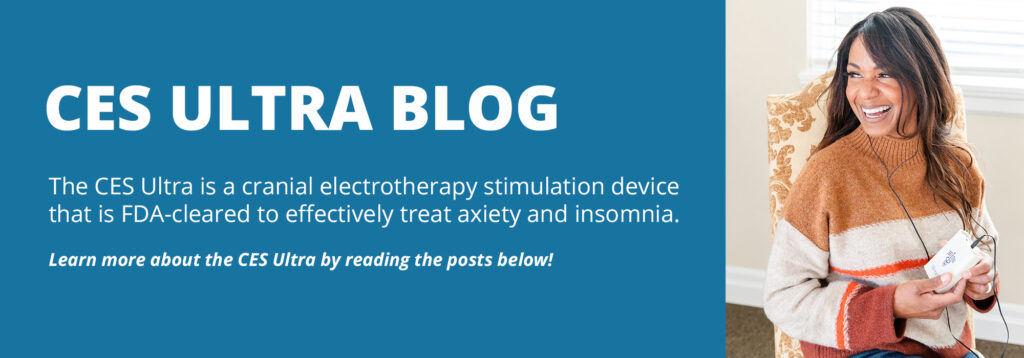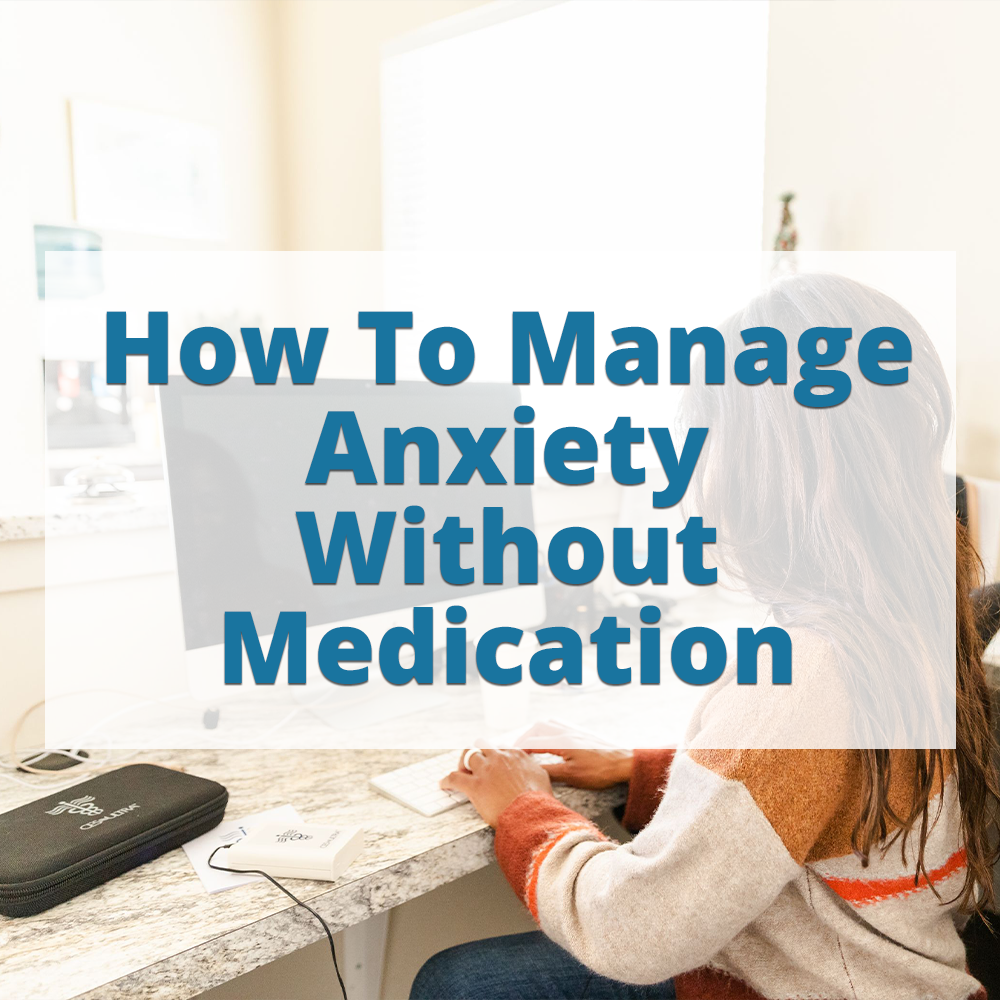Are you wondering how to manage anxiety without medication? Perhaps you’ve already tried medication and it didn’t work for you—or maybe you’re using medication, but need something more to start feeling better. Or, perhaps you are seeking a completely non-pharmaceutical plan to manage your symptoms. Whatever your situation, here is some very good news: evidence-based, FDA-cleared methods DO exist to manage anxiety without medication. In this article, we’ll discuss our 3 best tips.
In order to understand anxiety and how to heal, you first have to understand the root cause of anxiety: the nervous system.
Anxiety:Rooted in the Nervous System
The nervous system is essentially the command center of the body. It handles communication between the brain and the body. Anxiety always occurs as a result of stress on the nervous system. The source of stress can come from the past, present, or future.
Early in the days of humanity, our nervous systems evolved to protect us from the dangers of early life on planet earth. Early humans had to contend with a number of serious threats in order to stay alive. The autonomic nervous system developed two branches: the sympathetic state, and the parasympathetic state.
The parasympathetic state is optimal for growth, development, repair, and day-to-day life. It is the state that allows our bodies to “rest and digest” and recover from the wear and tear of life.
Stuck in “Fight or Flight?”
On the other hand, the sympathetic state is essentially S.O.S. mode. You may have heard it called “fight or flight” mode. Its purpose is to save peoples’ lives when they are in legitimate danger—think running from a tiger! This state releases a cascade of hormones causing a faster heart rate, higher blood pressure, quicker reflexes, and increased blood flow to the appendages to help us run away from or fight off threats. Do those symptoms sound familiar? Ideally, we’d spend most of our lives in the parasympathetic state and only experience the sympathetic state for short spans of times, recovering quickly.
However, this modern world has our nervous systems confused. We’re not running from tigers, but our fast-paced lives, endless to-do lists, and the highly stimulating environment we inhabit is tricking our bodies into thinking we’re in constant danger. Cortisol (the stress hormone) runs high, kicking us into fight-or-flight mode and preventing the periods of resting, healing and digesting that our bodies really need.
When we spend too much time in the sympathetic state due to perceived (or real) stresses of life, anxiety is often the result. And the problem is, once we’re trapped in the cycle, it’s really hard to break free. Stress causes anxiety, which causes trouble sleeping, which causes more stress and fear. We never catch a break, and our nervous systems keep working in overdrive to try to keep us alive. Over time, it takes a real toll. To manage anxiety without medication, you have to first address the patterns keeping you stuck.
Calming the Nervous System is Key
If you want to manage your anxiety naturally, without medication, calming the nervous system is key! You need to bring yourself out of that fight-or-flight state and back to a place of calm— but when you’re trapped in the cycle, that’s much easier said than done! Your brain has gotten comfortable in this wired survival mode. It’s gotten used to producing high levels of cortisol and it’s learned to survive on less serotonin, melatonin and endorphins. You’re stuck in an unhealthy pattern, and you need some help to pull out of that.
That’s why “lifestyle interventions” like meditation, mindfulness, relaxation techniques and just trying to be less stressed don’t always work (although those are excellent things to try!) We’re going to share with you 3 strategies that really make a difference in pulling out of fight–or-flight mode and resetting some of the neurochemical imbalances that keep you feeling anxious. Check them out below!
1. Cognitive Behavioral Therapy (CBT)
Cognitive behavioral therapy (CBT) is a therapy technique that focuses on helping you identify negative or damaging patterns of thought or behavior that keep you trapped in cycles of anxiety, depression, or self-doubt.
CBT helps you retrain your thought patterns and develop healthy responses to stress, and a healthy relationship with yourself. It can be a fantastic tool for managing anxiety, overcoming patterns of stress and fear, and feeling more satisfied with your life overall.
If you’re hesitant to hire a counselor or can’t afford it right now, you can start by using a CBT workbook at home. It will guide you through exercises from Cognitive Behavioral Therapy that will help you start building new habits and thought patterns on your own. If you still need extra help, you can see a counselor who is trained in CBT for anxiety.
CBT is safe to use in combination with other therapies and treatments, including other forms of talk therapy, medication, or cranial electrotherapy stimulation (CES) for anxiety. Learn more about CES therapy for anxiety here>>
2. Support your Brain with Supplementation
Did you know that nutrient deficiencies can actually cause anxiety and/or depression? When your body isn’t getting enough of a key nutrient like magnesium (which is very common due to our nutrient-poor diets and consumption of processed and chemical-ridden food) it can be impossible for your body to create certain neurotransmitters and leave you feeling sick and stressed. When you restore nutrient stores to proper levels, you might feel a whole lot better.
There are also fantastic herbs, amino acids and nootropics that can really help with anxiety. Supplements are a much more natural approach than medication, as they’ll work with your body and help retrain your brain to produce healthy levels of neurotransmitters on its own. Feeling better may be as simple as adding a few herbs, vitamins, or nootropics to your daily routine.
Ask your practitioner about 5-HTP, GABA, Magnesium, Inositol, L-Theanine, and nervine herbs, and find out the right combination for your needs. Imbalances in your brain and body can exacerbate anxiety. Proper supplementation can make a HUGE difference when your brain chemistry is balanced and functioning properly!
3. Cranial Electrotherapy Stimulation for Anxiety

A Cranial Electrotherapy Stimulation Device (CES Device) is a small, handheld device which stimulates specific areas of the brain with a tiny electric current. This microcurrent helps reorganize electrical signaling in the brain. Overtime, using a CES device has been shown to regulate neurotransmitters and improve neurochemical imbalances. These effects improve anxiety and insomnia in many users—so much so that some registered CES devices are cleared by the FDA as safe and effective way to manage anxiety without medication. There is also evidence that CES devices may help with depression, learning and memory, focus, and stress relief.
When CES originally came to the USA back in the 1960s, they called it “electrosleep.” Researchers in Europe had studied electrosleep for decades in an attempt to find a frequency that would reliably and consistently put patients to sleep. Though they never found that frequency, they discovered that the patients participating in trials started sleeping more deeply and waking up more rested.
From there, further studies attempted to determine whether electrosleep was safe and effective. Researchers confirmed that CES is extraordinarily safe, and does in fact rebalance neurotransmitters. It changes the chemical make-up of the brain in a positive way, promoting less stress, a calmer mind, and better sleep.
The FDA coined the term “CES” for these modern electrosleep devices. Though still largely a mystery to the general public, CES has been extensively studied for its benefits. It is a fantastic therapy for those who suffer from anxiety and insomnia. In some studies, CES performed better than sleeping pills and anxiety medication, providing relief for a vast majority of users.
What’s more, CES poses a very low risk of side effects. It is non-habit forming. In fact, it trains the brain to reach homeostasis and retain a healthy balance of neurotransmitters all on its own. The balance achieved through consistent treatment remains, even after treatment ceases.
“OFF LABEL” BENEFITS OF CES REPORTED BY MANY PATIENTS AND STUDIES INCLUDE:
- More efficient sleep onset
- Elevated mood
- Reduced symptoms of depression
- Reduction in episodes of irrational anger and irritability
- Fewer mood swings
- Improved impulse control
- Calmer patterns of thought
- Heightened mental clarity
- Accelerated learning
- Normalized information recall
- Improved task concentration and focus
How the CES Ultra Device Fixed my Anxiety Problem | Read my Story Here>>
Back in 2020, I went through some pretty major anxiety and insomnia. It got so bad I honestly thought I might die. It was a rough time in my life. I tried everything to get better. But it wasn’t until I tried CES Ultra that I started to find some true relief. CES Ultra changed everything for me–and I think it can do the same for you. Ready to give it a try? Order yours today by clicking the image below!

I hope this article gave you some ideas about how to manage anxiety without medication. Have more questions? Feel free to leave a comment – or check out some of our other articles below!
- Which CES Device is the Best? https://cesrelief.com/articles/2022/10/24/which-ces-device-is-the-best/
- Is it Possible to Remove Anxiety Permanently? https://cesrelief.com/articles/2022/10/03/remove-anxiety-from-your-life-permanently-is-it-possible/
- What is a Cranial Electrotherapy Stimulation Device? https://cesrelief.com/articles/2022/10/02/what-is-a-cranial-electrotherapy-stimulation-device/
**This article is written for informational purposes only, and does not constitute medical advice. Always work with a qualified healthcare provider when making decisions about your health and wellness.
Thanks for Reading,
Kara

